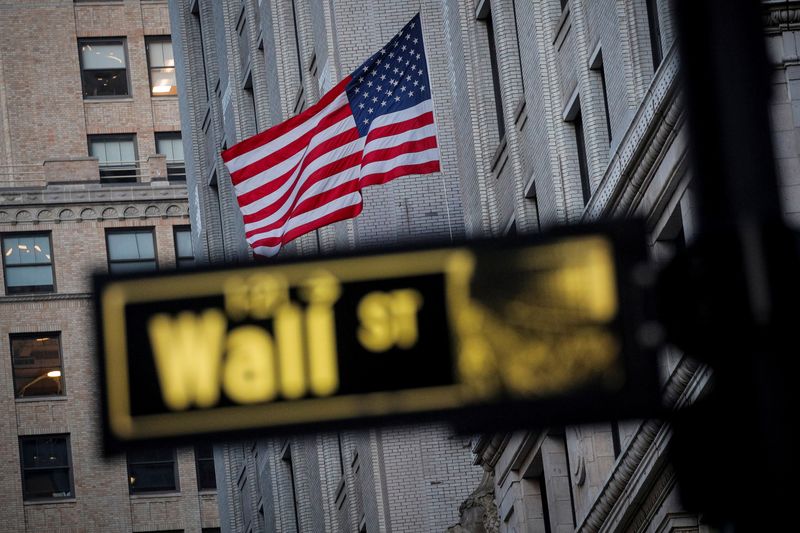(Reuters) - For the biggest Wall Street banks, the pandemic is largely in the rear view mirror as they step up efforts to bring employees back to office full-time while also easing or lifting COVID-19 protocols.
The finance industry, spearheaded by major banks, has sought to wind down remote work even though these plans were derailed by the outbreak of the Omicron variant earlier this year.
Here are the latest updates on the return-to-office plans of some of the major financial firms:
Goldman Sachs Group Inc (NYSE:GS):
The U.S. investment bank will lift pandemic-era protocols at its offices effective Sept. 6, an internal memo reviewed by Reuters showed.
Goldman had already called its employees back to the office full time in June last year, although it relaxed those requirements during periods when coronavirus cases surged.
The new guidelines will allow employees to enter the company's Americas offices regardless of vaccination status, except in New York City and Lima.
Goldman has also removed mandatory mask and regular testing requirements in office premises.
Morgan Stanley (NYSE:MS):
In August, the bank informed its New York metropolitan staff in a memo that it will discontinue all COVID testing and monitoring requirements from Sept. 5.
JPMorgan Chase & Co (NYSE:JPM)
In March, the largest U.S. bank made masks in its corporate office buildings voluntary and ended mandatory testing for unvaccinated employees. JPMorgan has also rolled back its policy of hiring only vaccinated individuals.
Chief Executive Jamie Dimon said in a letter to shareholders in April that the bank expected about 50% employees to return to office full-time, 40% to work under a hybrid model while the remaining 10% in specific roles can work fully remotely. (https://
Citigroup (NYSE:C):
The U.S. bank has dropped its regular testing and mask requirements in line with the U.S. official guidance and expects a majority of employees to be in office at least three days per week, a person familiar with the matter told Reuters.
Citi is maintaining its mandatory vaccination requirement for U.S. workers, in place since January, unless they are granted an exception, as a condition of employment, the source said.
Wells Fargo (NYSE:WFC):
The bank said most of its employees returned to office in March under a flexible hybrid model which requires staffers to spend a minimum of three days a week in office.
Wells added it has not mandated vaccinations, masks and testing for employees except in locations where they are locally or legally required.
Deutsche Bank AG (NYSE:DB)
The bank continues to operate under a flexible working model it rolled out last year in the United States.
Jefferies Financial Group:
Chief Executive Richard Handler said in a letter that the investment bank would rather have its staff back at office working together than in "lonely home silos" to get the most out of the final quarter of the year.
"As long as COVID continues to be manageable, we need everyone back in our offices on a consistent basis," Handler said.
BlackRock Inc (NYSE:BLK):
The asset management giant has been an outlier on Wall Street so far. A spokesperson for the company said it was maintaining its policy of requiring employees to work from office three days a week, a requirement it had put in place in November.
Bank of America Corp (NYSE:BAC):
Chief Executive Officer Brian Moynihan said during a New York industry conference that Bank of America will outline flexible working standards over the next six to eight weeks that will adapt to changing conditions.
"We'll have more formality to the flexibility," to make standards more consistent and fair across business units, he said, adding that the bank's buildings are full and active.
CANADA
Royal Bank of Canada:
Last month, Canada's largest bank said it was updating its hybrid work arrangement that could see more employees coming to the office.
"As we move into the fall, I'm asking our leaders and colleagues to come together more often in person," Chief Executive Officer Dave McKay said in a memo.
Bank of Montreal:
The bank in an emailed statement to Reuters said many of its employees have returned to offices over the last year and its work models, namely office-based, hybrid or remote, are driven by customer and business needs.
Canadian Imperial Bank of Commerce:
The lender said its employees have been working under a hybrid model since earlier this year, with the amount of time expected at the office dependent on the role.
Bank of Nova Scotia:
The bank said from September onwards it intends to increase on-site work for particular roles, resulting in more employees returning to office in the fall.
"We require employees and new hires to disclose their vaccination status, but no longer require new employees to be vaccinated. Testing requirements for unvaccinated employees have also been removed," a spokesperson for Scotiabank added in an emailed statement.
National Bank of Canada (OTC:NTIOF):

A spokesperson for the bank said it lifted most COVID measures last spring. The lender has adopted a hybrid model with the time expected at office dependent on individual teams.
Source: Company statements, memos, sources
